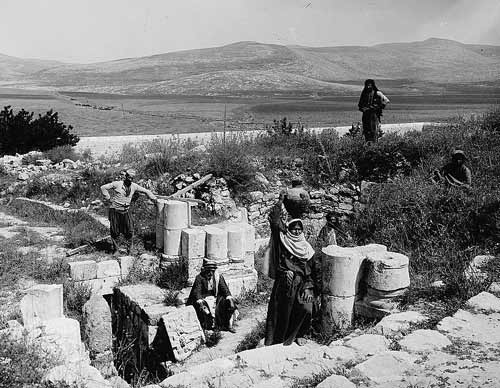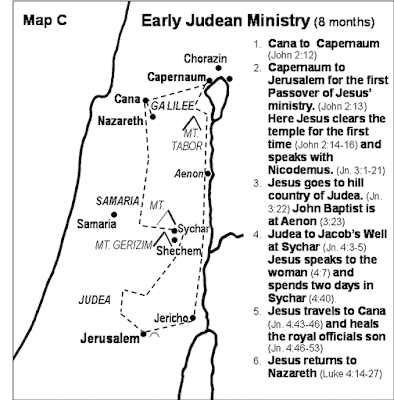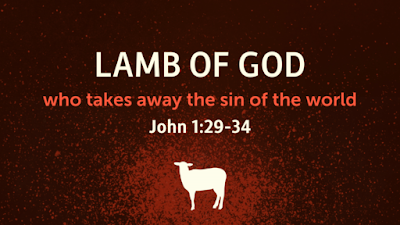FROM THE FIRST TO THE SECOND
PASSOVER (Time: One Year.)
Section 24
JESUS ATTENDS THE FIRST PASSOVER OF
HIS MINISTRY
(Jerusalem, April 9, A. D. 27.)
Subdivision
SUBDIVISION A
JESUS CLEANSES THE TEMPLE
JOHN 2: 13-25
It seems confrontational to me for Christ to purge the temple at Passover, but Matthew Henry points out that it was keeping with tradition to purge out the old/bad, repent, and then be cleansed to celebrate the Passover.
Comfortingly, Jon Courson agrees with me:
"In verse Joh_2:7, Jesus quietly met a need.
In verse Joh_2:14, He conspicuously caused a scene.
In verse Joh_2:2, Jesus sat at the marriage table.
In verse Joh_2:15, He overturned temple tables.
At Cana, Jesus created the wine of joy.
In the temple, He initiated the work of judgment."
His commentary afterward is worthwhile:
Jesus exhibited righteous anger…
In Mat_18:6, Jesus used strong language to describe the punishment of anyone who caused a child to stumble. In Mar_10:14, Jesus was "much displeased" when His disciples hindered little children from coming to Him. In Mar_3:5, Jesus looked with anger on the Pharisees who were eager to prosecute Him for healing on the Sabbath. And here in John 2, Jesus' anger is seen in the cleansing of the temple.
Please note that in all four of these situations, Jesus' anger is directed toward those who put up barriers to prevent others from coming to Him. We often think the Lord is angry with our watching TV or with our imperfections and inconsistency. We think He's angry with us for not reading the Word or for not praying. But in reality, what angers the heart of Jesus are those things that keep others from experiencing and enjoying the presence of God—traditions that say, "You can't be healed on the Sabbath," or inspections that say, "Your sacrifice is unacceptable." -Jon Courson
I think this is one of the many things that feel authentic about Jesus---he's not tidy. He's not a people pleaser and is incredibly intentional in his actions. His actions are always greater than their context, reaching far beyond the immediate and literal.
"But Jesus did not trust himself unto
them, for that he knew all men" John 2:24
The word here translated
"trust" is the same as that translated "believe" in the
preceding verse. They trusted him, but he did not trust them, for he knew them. He did not tell them anything of
his plans and purposes, and the conversation with
Nicodemus which follows is a sample of this reticence],
25 and because he needed not that any one should bear
witness concerning man; for he himself knew what was
in man. [John gives us many examples of this supernatural
knowledge which Jesus possessed. See 1:42, 47, 48; 3:3;
4:29; 6:61, 64; 11:4, 14; 13:11; xxi. 17. This chapter itself
gives us a faithful picture of "what was in man." We find in
it temple, profaners, money-makers, sign-seekers, opposers
of reform, false and weak professors of faith, etc., but none
to whom Jesus could trust himself. -Fourfold Gospel
Between the temple cleansing and this comment, one thing is very clear to me: the Lord's perspective--unbounded by time and omniscient in scope-is vastly different and distinct. I should not assume that His thoughts would be my thoughts, as Isaiah prophesied.
SUBDIVISION B
JESUS TALKS WITH NICODEMUS
JOHN 3:1-21
"Jesus answered --Not the words, but the
thoughts of Nicodemus. The answers of Jesus often look
rather to the thoughts of the questioner than to the form of
the question." -Fourfold Gospel
"For everyone who does wicked things hates the light and does not come to the light, lest his works should be exposed. But whoever
does what is true comes to the light, so that it may be clearly seen that his works have been carried out
in God.” -John 3:20
Doeth the truth (ποιῶν τὴν ἀλήθειαν)
The phrase occurs only here and in 1Jn_1:6. Note the contrasted phrase, doeth evil (Joh_3:20). There the plural is used: doeth evil things; evil being represented by a number of bad works. Here the singular, the truth, or truth; truth being regarded as one, and “including in a supreme unity all right deeds.” There is also to be noted the different words for doing in these two verses: doeth evil (πράσσων); doeth truth (ποιῶν).
The latter verb contemplates the object and end of action; the former the means, with the idea of continuity and repetition. Πράσσων is the practice, while ποιῶν may be the doing once for all. Thus ποιεῖν is to conclude a peace: πράσσειν, to negotiate a peace. So Demosthenes: “He will do (πράξει) these things, and will accomplish them (ποιήσει).” In the New Testament a tendency is observable to use ποιεῖν in a good sense, and πράσσωιν in an evil sense. Compare the kindred word πρᾶξις, deed or work, which occurs six times, and in four out of the six of evil doing (Mat_16:27; Luk_23:51; Act_19:18; Rom_8:13; Rom_12:14; Col_3:9). With this passage compare especially Joh_5:29, where the two verbs are used with the two nouns as here. Also, Rom_7:15, Rom_7:19. Bengel says:
“Evil is restless: it is busier than truth.” In Rom_1:32; Rom_2:3, both verbs are used of doing evil, but still with a distinction in that πράσσω is the more comprehensive term, designating the pursuit of evil as the aim of the activity. -Vincent's Word Studies
Be born again (γεννηθῇ ἄνωθεν)
See on Luk_1:3. Literally,
from the top
From the very first (ἄνωθεν)
Lit., from above; the events being conceived in a descending series.
Canon Westcott calls attention to the traditional form of the saying in which the word ἀναγεννᾶσθαι, which can only mean reborn, is used as its equivalent. Again, however, does not give the exact force of the word, which is rather as Rev.,
anew, or afresh. Render, therefore, as Rev., except a man be born anew. The phrase occurs only in John's Gospel. -VWS
"'As to the
import of the passage, Luther's words are pertinent: "My
doctrine is not of doing, and of leaving undone, but of
being and becoming; so that it is not a new work to be
done, but the being new created--not the living otherwise,
but the being new-born.'"-Fourfold Gospel
Kingdom of God (ἡ βασιλεία τοῦ θεοῦ)
Matthew has kingdom of heaven, or of the heavens (τῶν οὐρανῶν), a phrase used by him only, and most frequently employed by Christ himself to describe the kingdom; though Matthew also uses, less frequently, kingdom of God. The two are substantially equivalent terms, though the pre-eminent title was kingdom of God, since it was expected to be fully realized in the Messianic era, when God should take upon himself the kingdom by a visible representative. Compare Isa_40:9, “Behold your God.” The phrase kingdom of Heaven was common in the Rabbinical writings, and had a double signification: the historical kingdom and the spiritual and moral kingdom. They very often understood by it divine worship ; adoration of God; the sum of religious duties; but also the Messianic kingdom.
The kingdom of God is, essentially, the absolute dominion of God in the universe, both in a physical and a spiritual sense. It is “an organic commonwealth which has the principle of its existence in the will of God” (Tholuck). It was foreshadowed in the Jewish theocracy. The idea of the kingdom advanced toward clearer definition from Jacob's prophecy of the Prince out of Judah (Gen_49:10), through David's prophecy of the everlasting kingdom and the king of righteousness and peace (Psalms 22, 72), through Isaiah, until, in Daniel, its eternity and superiority over the kingdoms of the world are brought strongly out. For this kingdom Israel looked with longing, expecting its realization in the Messiah; and while the common idea of the people was narrow, sectarian, Jewish, and political, yet “there was among the people a certain consciousness that the principle itself was of universal application” (Tholuck). In Daniel this conception is distinctly expressed (Dan_7:14-27; Dan_4:25; Dan_2:44). In this sense it was apprehended by John the Baptist. -VWS
And as Moses lifted up the serpent in the wilderness, even so must the Son of man be lifted up. John 3:14
Must (δεῖ)
Must signifies
the eternal necessity in the divine counsels. Compare Luk_24:26, Luk_24:46; Mat_26:54; Mar_8:31; Joh_12:34. -VWS
The reference here is to the crucifixion, but beyond that, to the glorification of Christ.
It is characteristic of John to blend the two ideas of Christ's passion and glory (Joh_8:28; Joh_12:32). -VWS
Hence the believer overcomes the world through faith in Him who came not by water only, but by water and blood (1Jn_5:4-6). -VWS
Never thought about the potential change in speakers here...not sure what I think. Did Jesus refer to himself as "the Son" in this kind of 3rd person way?:
The interview with Nicodemus closes with Joh_3:15; and the succeeding words are John's. -VWS
Vincent's Word Studies makes a strong case for the voice being John's.

































